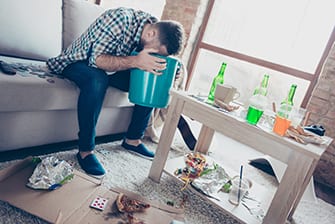What is Alcohol Poisoning?
Alcohol poisoning is a serious – and sometimes fatal – consequence of drinking too much alcohol too quickly. The National Institute on Alcohol Abuse and Alcoholism estimates that 88,000 individuals die from alcohol-related causes annually, making alcohol the third leading preventable cause of death in the United States.
Causes of Alcohol Poisoning
Alcohol comes in many forms and is found in many products aside from alcoholic beverages.
- Ethyl alcohol: Found in alcoholic beverages, cooking extracts, mouthwash, and some household products.
- Isopropyl alcohol: Found in rubbing alcohol, lotions and some cleaning products.
- Methanol or ethylene glycol: A common ingredient in paints, solvents, and antifreeze.
All of the above can cause toxic poisoning, but ethyl alcohol poisoning is the result of drinking too many alcoholic beverages.
The human body processes alcohol very quickly and aggressively. In fact, alcohol can be absorbed into the bloodstream in as few as 30 minutes after drinking. That’s why binge drinking is a major cause of alcohol poisoning.
- Binge drinking occurs when a male consumes five or more drinks within two hours, or a female consumes at least four drinks within two hours.
- When an individual consumes large amounts of alcohol within a short time frame, the body is unable to process the alcohol fast enough – it also has difficulty breaking down the toxins in alcohol, which results in the feeling of intoxication lasting longer.
- An individual can easily consume a fatal amount of alcohol before passing out – and even if you’ve stopped drinking or are unconscious, your stomach and intestines can continue to release alcohol into your bloodstream.
What can increase your risk?
- Overall health
- Size and weight
- Presence of food in the stomach
- Combining alcohol with other drugs
- Tolerance level
- Strength of the alcohol in your drinks
Symptoms of Alcohol Poisoning
An individual with alcohol poisoning needs immediate medical attention. Every second counts, and it’s important you’re able to recognize when someone has consumed too much alcohol. The Mayo Clinic lists the following as signs and symptoms of alcohol poisoning:
- Confusion
- Vomiting
- Seizures
- Slow breathing (less than eight breaths per minute)
- Irregular breathing (a gap of more than 10 seconds between breaths)
- Blue-tinged skin or pale skin
- Lower body temperature
- Incoherency
- Unresponsiveness
If alcohol poisoning is left untreated, it can have far graver consequences.
- Hypothermia
- Brain damage
- Hypoglycemia
- Abnormal heartbeat
- Death
Identifying and taking fast action against alcohol poisoning can mean the difference between life and death.
How to Handle Alcohol Poisoning
If you suspect an individual has alcohol poisoning – even if any or all the above symptoms are not noticeable – seek medical care.
- Don’t panic. Take a deep breath, stay focused, and take steps to handle the situation.
- Call for help. Never assume an individual will sleep off alcohol poisoning – call 911 or your local emergency number immediately.
- Provide necessary information. Once you’re speaking with a medical professional or an emergency medical dispatcher, answer any questions as honestly as you can – including the kind and amount of alcohol consumed.
- Watch over the individual. Don’t leave them alone if unconscious. An individual with alcohol poisoning can choke on his or her own vomit and lose the ability to breathe.
- Help with vomiting. Preferably, keep the individual sitting up. If they must lie down, ensure their head is turned to the side and try to keep them conscious.
- Don’t be afraid to seek help. Especially if you’re underage, you may be worried that contacting the authorities will get you in trouble – but not getting help can lead to far more serious consequences. Some states offer minors protection from legal prosecution in the event of alcohol poisoning – see which states have passed 911 Lifeline Legislation here.
How to Prevent Alcohol Poisoning
There are many ways to avoid alcohol poisoning altogether, such as:
- Drink responsibly. Healthy adults should stick to one drink a day, and Eastern Washington University recommends alternating alcohol with nonalcoholic beverages. If possible, abstain from alcohol altogether.
- Know your limits. Don’t feel pressured to drink more than you can handle. Set a limit for yourself before you start drinking.
- Remember to eat! Drinking on an empty stomach can increase your risk of alcohol poisoning. A full stomach can slow alcohol absorption.
- Store products safely. If you live with small children, make sure household products and alcoholic beverages are out of reach.
About Pinelands Recovery Center
Alcohol poisoning can be fatal, but it can also be a wake-up call. It’s often a symptom of a larger problem – alcohol addiction – and continued alcohol abuse only increases your risk of alcohol poisoning.
Pinelands Recovery Center of Medford is widely known as one of New Jersey’s finest, most respected addiction treatment facilities. With comfortable 30-bed accommodations and 24-hour professional staff, we can offer clients a serene, relaxing environment amid the lush piney woods. This stress-free setting with its sense of warmth and welcoming enables you to feel comfortable and confident about your clean and sober life ahead.
We will establish clear goals, both general in nature and specific to your needs. We continue to monitor those goals, to make sure that our clients are progressing and buying into their recovery plan. We thrive on assisting clients in feeling connected to the recovery community, share and demonstrate effective coping techniques, help clients to modify attitudes and patterns of behavior and everything else you will need to be happy and productive living a sober, healthy life.
We ensure that clients complete their planned concrete tasks, encourage hope, optimism and healthy living. Our recovery program is not a revolving door treatment program; it is a recovery model designed to help clients go on to lead productive, happy lives. For more information, visit pinelandsrecovery.com
